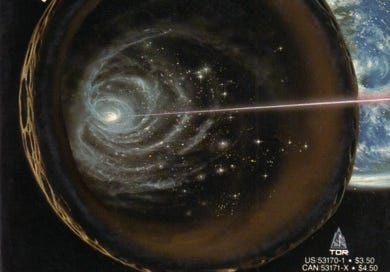Late on Saturday, I was saddened to hear that Greg Bear had passed away. He was one of those figures whose influence on science fiction was so significant, it’s actually difficult to encompass.
He was mostly referred to as a hard SF guy, but his range was considerably wider. I recently mentioned him in this newsletter when I talked a bit about the nanotech/nanopunk boom in 1980s/90s – he kicked it off with Blood Music, and added to it later with a series beginning with Queen of Angels. He wrote some galaxy-spanning hard SF space stories like The Forge of God and its sequel, The Anvil of Stars. He worked with the other "Killer B’s” (Gregory Benford and David Brin) on a trilogy of prequel novels to Foundation. He wrote works that mashed up deep space SF with horror, in Hull Zero Three, or that followed in the tracks of Conan Doyle’s lost world books, with Dinosaur Summer.
But I’m going to talk briefly about Eon, a book that dug its claws into my brain and is at least in part responsible for how I think about worldbuilding and idea-driven science fiction.
Eon is extraordinarily difficult to summarize.
Published in 1985, it’s one of those books that lives in the shadow of history – it takes place in an early 21st century where the NATO-Warsaw Pact Cold War is still going on.1 With tensions high, a mystery object – a sizeable asteroid – appears in space, heads towards earth, and enters orbit. Naturally, both the Soviets and the Americans try to get up there, where they discover that it’s been hollowed out, spun up to create gravity, and filled with cities. All of which appears to be abandoned.
Much of the first half of the novel is a sort of technothriller, with soldiers on both sides of the divide, scientists, and politicians trying to gain control of the object without setting off a major incident/nuclear war. The scientists have quickly realized that the object is from the future. It’s human made, and the records in the libraries indicate it was constructed by the survivors of a US-Soviet nuclear war.
So that’s bad.
On the other hand, the records indicate that the war should have already happened – the arrival of the asteroid known as the Stone (or the Potato, to the Russians) has altered history.
Increasingly, in the second half of the book, we find out more about what happened to the inhabitants of the Stone. They’re not gone – they devised a peculiar singularity that extended the final chamber of the stone, into infinity. A giant tube that goes on forever, filled with air and light, and intermittent gateways to alternate universes. Which has caused its own problems…
If it sounds like this is just a delivery system for worldbuilding, it’s not. There is a lot of time spent with characters – the American physicist Vasquez, the Russian officer Mirsky, and the post-human Ser Olmy stand out in particular – for being well drawn.
Bear was one of the authors who straddled the divide between the old-school engineering-diagram-fiction of the mid-century, with its preponderance of stock square-jawed crew-cut heroes, and the character-driven fiction that began to dominate post-New Wave.
I could talk about Eon (or Queen of Angels, or Blood Music, or Anvil of Stars) for a long time, but I wanted to just focus on the extraordinary depth that Bear brought to his ideas in this particular book.
I don’t know what provided the seed around which Eon grew. Was it the infinite singularity tube? The arrival of the mysterious asteroid? The branching universes, the post-human society, the gateways to infinite worlds?
Whatever it was, he did one of the things I really love in a big SF novel – he refused to narrow his vision. He doesn’t turn away from any of the implications of his ideas. It leads to a novel that feels genuine because of its depth and complexity. In a field where high concept pitches get a lot of attention, Eon is impossible to summarize in a single sentence. And that’s what makes it a novel worth revisiting now.
It’ll be a less vital field without Greg Bear. R.I.P.
This is less of a problem as the book goes on, honestly.





I never read Eon, but Forge of God was brilliant.